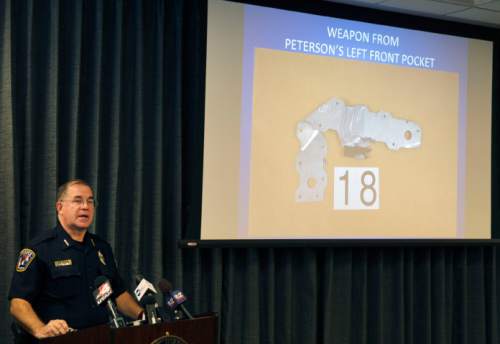This is an archived article that was published on sltrib.com in 2014, and information in the article may be outdated. It is provided only for personal research purposes and may not be reprinted.
Some sort of legislation addressing police body cameras is likely to be discussed by state lawmakers this coming session, but what if anything will emerge is hard to predict.
As co-chairman of the Legislature's Law Enforcement and Criminal Justice Interim Committee, Sen. Todd Weiler, R-Woods Cross, said Thursday, lawmakers undoubtedly will consider the matter in light of several recent officer-involved fatal shootings in Utah — as well as the high-profile case in Ferguson, Mo.
"I'm just surmising this will be a lively discussion point," Weiler said, adding that he has no plans to introduce a bill, but thought someone such as Rep. Paul Ray, R-Clearfield, might.
Ray said Thursday he has no plans to introduce a bill, being skeptical of the value of body cams until the technology improves. But he welcomes a legislative discussion.
"They're a good idea, eventually, when we get the technology right," Ray said. "But right now there are a lot of glitches. Until we can fix those and make sure officers get proper training and funding, I'm not going to want to mandate anything."
Weiler also does not have any appetite for mandates.
"If we passed a body-camera bill that said every law enforcement officer in the state had to wear one, we would have to fund that, or there would be push-back from cities and counties claiming we're burdening them with unfunded mandates," he said. "They're going to be screaming, 'That's not fair.' Then, if we pass it, we'll have to spend money on equipment and training instead of things we have traditionally been struggling to fund, like education."
But there is merit in reviewing what's possible and what's not, Weiler said, citing increasing public concern about officer-involved shootings and a move by many local departments to equip their officers with body cameras.
A UtahPolicy poll in late August showed that more than 80 percent of Utahns want police officers to wear cameras.
More and more departments are moving that direction.
West Valley City Police Chief Lee Russo recently told his City Council he was initiating steps to acquire cameras by early next year. The Park City, American Fork and Perry police departments already have done so. Salt Lake City and the multijurisdictional Unified Police Department are in various stages of implementing policies, too.
Weiler speculated that state lawmakers could require officers to turn on cameras whenever they engage the public.
"All you have to do is tap your chest to turn it on or off," he said. "Having the camera rolling will protect the officer and the department because people will know more about what's going on. When you have an unarmed civilian killed by an officer who chose not to turn it on, that leads to a lot of suspicion and people making assumptions."
In two of Utah's three recent officer-involved fatal shootings — Darrien Hunt was killed Sept. 10, in Saratoga Springs; Ty Worthington was killed Saturday in South Jordan — officers were wearing body cams but did not have them turned on when the deadly encounters occurred.
But Ray, a former police officer who said he has experience with this camera technology, maintained that requiring officers to use their cameras — or face legal consequences — is troublesome.
"A body camera is not a fix-all. It has limited use, like a dashboard camera," he said. "The public has unreasonable expectations, based on what they've seen on TV, about what body cams can do.
"It's easy for them to malfunction, especially if the officer is involved in a tussle," Ray added. "Things could be blamed on an officer that are not right. Situations happen so fast. In a lot of cases, confrontations arise when an officer thinks it's just going to be a public contact, no big deal. Then suddenly that person attacks . If [the officer] doesn't have time to turn on the body cam, will he have violated the law?"
Weiler shares those concerns.
"One of the things we need to weigh," he said, "is the fact that just because there is a camera, that doesn't tell 100 percent of the story. There are limitations."
The legislative session begins Jan. 26.
Twitter: @sltribmikeg



